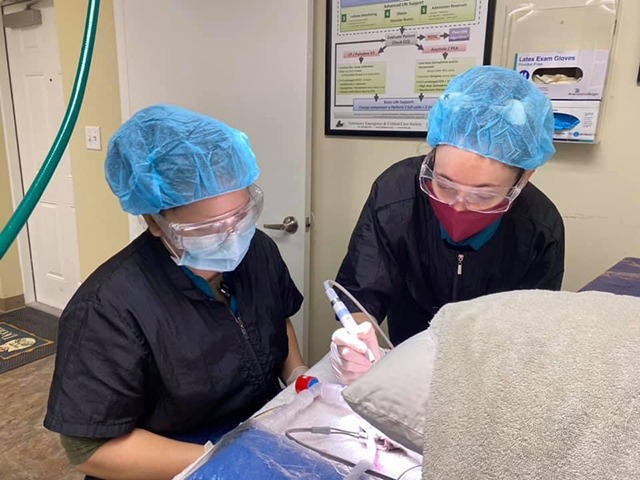Veterinary Dentistry

Regular professional cleanings are important for our feline friends. While sometimes a vocal cat can indicate dental pain, more often than not, cats tend to be asymptomatic and continue to eat.
While it’s useful for survival in the wild, a cat’s ability to suffer silently can hinder its owner’s ability to know when dental problems are occurring. Although cats have a higher tolerance for pain, that doesn’t make their pain any less valid or necessary to treat.
With regular dental care, we can detect and treat painful dental problems and, better yet, prevent the issues from occurring altogether.
Dental Methods Used
Our pet hospital uses modern and safe ultrasonic units to clean each tooth thoroughly – above and below the gum line.
Dental technicians polish teeth to create a smooth, lustrous tooth surface that’s more resistant to plaque buildup. Fluoride treatments help strengthen enamel and reduce tooth sensitivity.
Some cats are more susceptible to tartar or “calculus,” which is a harder, calcified plaque. For this condition, we use dental scaling, followed by polishing and fluoride. Our ultrasonic dental unit has a high-speed vibration that gently but thoroughly cleans the teeth above and below the gum line.
If our veterinarian recommends them, advanced dental care and digital dental radiography are also available.
Before The Dental Procedure
Before your cat undergoes any procedure, our veterinarian will discuss your cat’s dental needs. If infection is noted in the tissue around the teeth, antibiotics may be prescribed.
Since your pet must be anesthetized for a thorough cleaning, any risk associated with the anesthesia will also be discussed. Blood tests to assure adequate organ function will be performed.
When your cat undergoes a dental procedure we ensure your cat receives state-of-the-art monitoring.
Instructions For The Day Before
Your Cat’s Dental Procedure
Dentistry can be done any weekday during our regular business hours.
Our animal hospital requests that you do not feed your cat after 10:00 p.m. the night before the dentistry. If your cat is a special needs patient, like a diabetic, we will give you specific instructions.
Please bring your pet to the veterinary hospital before 9:00 a.m. on the day of the procedure. Most patients can go home the same afternoon or evening.
After The Procedure
After your cat’s dental care, we send home dental hygiene materials at no charge to help you prevent or slow down the progression of dental issues.
While dry pet food and treats can help prevent tartar build-up and strengthen the gums and teeth, they do not totally prevent the build-up of calculus. If your cat is especially susceptible to this, our veterinary team may recommend:
- More frequent, routine cleanings
- Daily brushing with a specially designed toothbrush ad pet dentifrice, which many cats will tolerate after a gradual introduction period
- For those who don’t tolerate brushing, dental gels, rinses and chews may be recommended as a more practical alternative
Call our animal clinic today or make an appointment online to have your cat’s dental needs assessed and ensure optimal health for your beloved feline!
